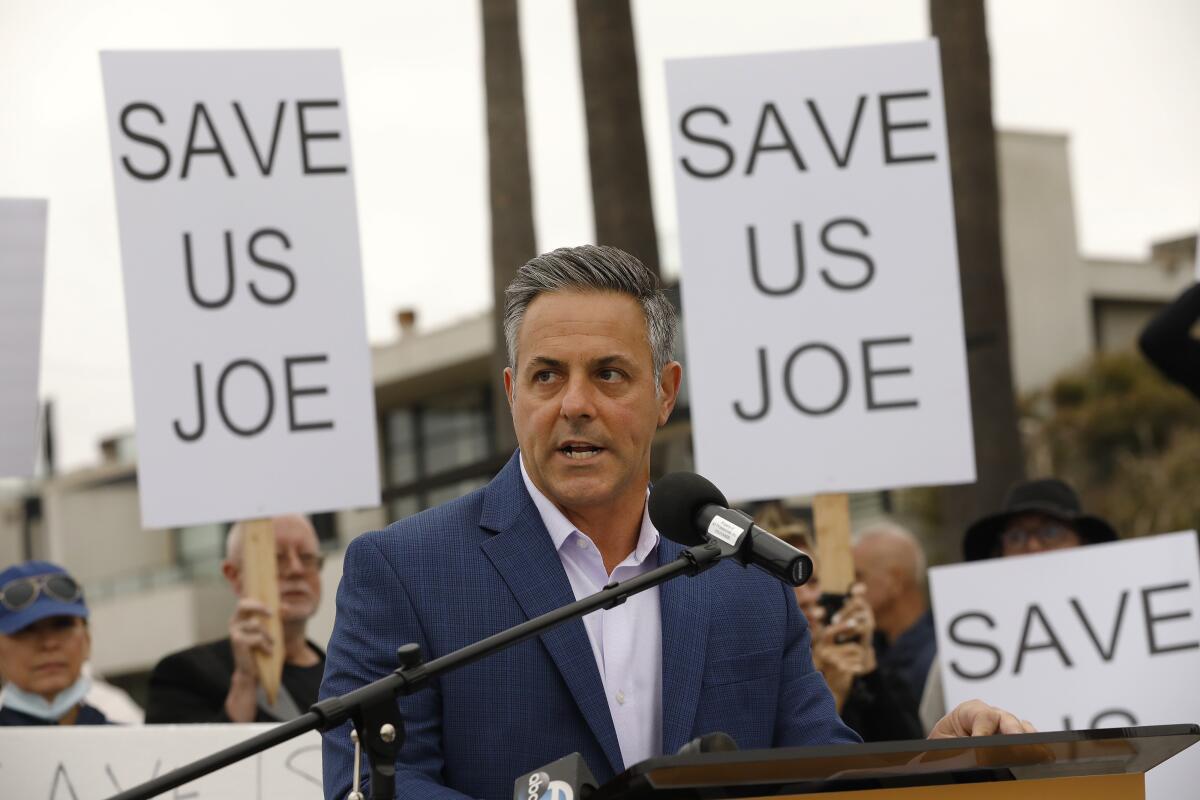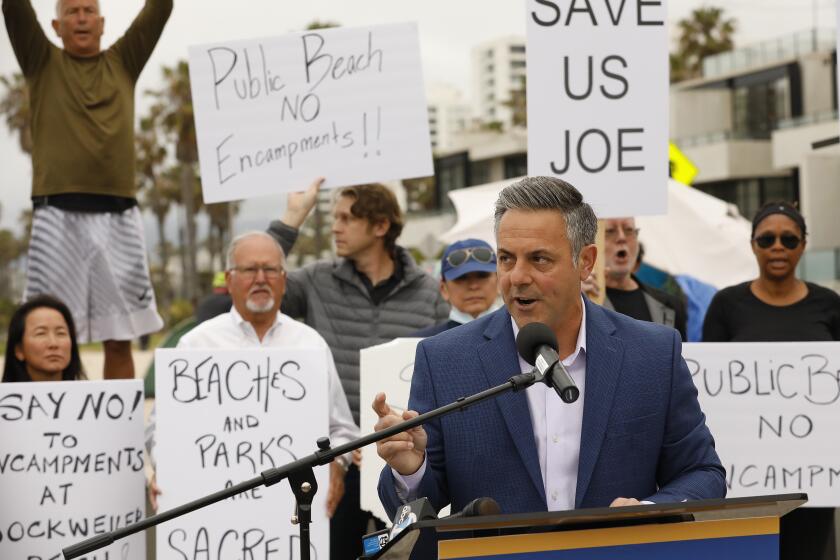Buscaino: Dock L.A. leaders’ salaries if sufficient progress isn’t made on homelessness

- Share via
Councilman Joe Buscaino last fall introduced plans for a controversial June ballot measure that would prohibit people from sleeping outdoors in public spaces in Los Angeles if they have turned down offers of shelter.
When that effort flagged at the City Council, Buscaino said he would instead aim to place his “Safer and Cleaner L.A.” measure before voters in November. He launched that effort Friday, submitting papers to the city clerk that, if approved, will allow him to begin gathering the nearly 65,000 valid voter signatures required.
A draft version of the proposal largely reflected the plans the mayoral candidate had previously laid out, including the controversial anticamping provision and changes in city code that would give the mayor additional land-use authority during a declared state of emergency related to homelessness.
But it includes one new eye-opening provision: docking the pay of elected city leaders if they don’t make sufficient progress on homelessness.
The approach has precedent on the state level: California voters in 2010 passed a proposition that cuts off lawmakers’ pay if they fail to pass a balanced budget by the deadline. Buscaino’s proviso would theoretically apply to the mayor and city attorney, as well as the council, but it may run into legal trouble because of conflicts with the Los Angeles City Charter.
Buscaino, who is running for mayor, said he intends to ask his colleagues to place his proposal on the June 2022 ballot, one where he also plans to appear as a candidate.
“What I’m experiencing now is that it takes too damn long to implement 41.18 while people are suffering, are dying on our streets,” Buscaino said, referring to a separate anticamping ordinance, approved in July, that outlaws camping in specific locations that have been targeted and approved by the council.
The proposed measure was decried by homeless advocates when it went before the council in November. In a Twitter thread, the Koreatown-based volunteer homeless outreach organization Ktown for All wrote that the measure “would destroy our services system and replace it with something even worse, while escalating the city’s cruelty towards unhoused Angelenos.” The organization also contended that the proposal was driven by electoral politics, rather than good policy.
The hard-line approach to homelessness that has distinguished Buscaino from his colleagues has also defined his lane in the mayoral race.
The San Pedro councilman’s proposed ballot measure would prohibit individuals from sleeping on streets, sidewalks or other public property if they have turned down two offers of shelter or emergency housing. Those offers could include congregate shelters or a tent in a city-provided location, according to Buscaino’s policy director, Dennis Gleason.
Widespread enforcement of any anticamping ordinance would likely be contingent on the city dramatically increasing the number of available beds. A 2018 appellate court decision bars cities from punishing homeless people for sleeping outdoors if sufficient shelter is not available.
The draft ballot measure cites the precedent-setting case Martin vs. City of Boise and suggests that Los Angeles would be in compliance by having made the offer of shelter before acting on enforcement.
The measure would give the mayor additional land-use authority during a declared state of emergency related to homelessness, including the ability to waive zoning restrictions, typical procurement procedures and environmental examinations for shelter facilities.
It would also require the incoming mayor to come up with a detailed plan for solving homelessness in the city within three years. The plan, which would have to include the number of beds the city would need to reach “functional zero” homelessness, would have to be approved by the City Council and monitored by an independent auditor.
This is where the complicated provision on docking salaries would come into play.
If the city doesn’t have 50% of the number of beds deemed necessary to meet “functional zero” after 18 months, the mayor, city attorney and City Council members would face financial penalties: Their salaries would be deferred “in an amount equal to the percentage that the goal was not achieved” for the next 18 months. The withheld portion of their salaries would either be paid or forfeited at the end of the third year, depending on whether the goals have been met.
(According to the draft measure, achieving “functional zero” would mean that the city has enough interim housing for its chronically homeless population. The population figure would come from the most recent Los Angeles Homelessness Services Authority point-in-time count.)
But there are questions about the legality of the salary provision. The rules for compensating elected officials are in the L.A. City Charter, but the proposed measure doesn’t seek to amend the charter. That would require voter approval through a measure requiring hundreds of thousands of signatures.
“The charter seems unambiguous about the compensation of elected officers,” said Raphael J. Sonenshein, a local governance expert and executive director of the Pat Brown Institute for Public Affairs at Cal State Los Angeles. “In a conflict between an ordinance and the charter, the charter would prevail.”
Michael Trujillo, a political consultant working with Buscaino, maintained that the proposed measure would not conflict with the charter, and deferring salaries would be legal.
The specifics of how enforcement of the anticamping ordinance would work are not spelled out in the draft ballot measure, beyond noting that violators may be eligible for prosecutorial-led diversion programs.
Gleason said the Buscaino team was looking at a model with escalating penalties, in which an individual’s first contact with law enforcement would merely be educational. The person could be given an infraction citation after a second contact and a possible misdemeanor citation following the third.
“It would really be the fourth occasion where there would be potential for arrest,” Gleason said.
Though technically separate from Buscaino’s mayoral bid, the ballot measure drive echoes his primary campaign platform.
“Candidates have hitched their wagons to ballot measures before,” said Jessica Levinson, an election law professor at Loyola Law School and a former president of the Los Angeles City Ethics Commission. “It’s a very specific way of showing your support on an issue.”
More to Read
Sign up for Essential California
The most important California stories and recommendations in your inbox every morning.
You may occasionally receive promotional content from the Los Angeles Times.















